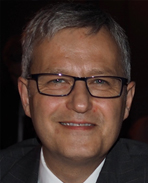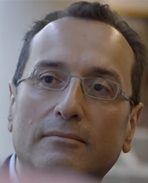| Course #1 |
Hypotension prediction index: from bench to clinical impact |
| Course #2 |
Remimazolam for General Anesthesia: An update on its clinical use and hemodynamic drug profile |
| Course #3 |
New development in brain oximetry monitoring |
| Course #4 |
Video Laryngoscopy: Are we asking the wrong question? |
| Course #5 |
Postoperative respiratory complications |
[Course #1] |
Hypotension prediction index: from bench to clinical impact |
Sep 16(Thu) 16:00-17:00 in KST (GMT +9)
- Speaker
-
Bart Geerts
Amsterdam Medical Center, Netherlands
Bart Geerts is an anaesthetist, intensivist and clinical pharmacologist. He currently works as an intensivist at Spaarne Gasthuis in Haarlem the Netherlands, CEO of Healthplus.ai (a 12-people startup that re-uses EHR data to predict postoperative complications), and an advisor to NL which is the largest European Healthtech and Biotech venture builder. Bart has over a decade of clinical research under his belt with papers about hemodynamic physiology, and machine learning in health care in journals like JAMA and Nature Medicine.
- Moderator
- Yunseok Jeon (Seoul National University, Korea)
- Panels
-
Dong Kyu Lee (Dongguk University, Korea)
Jong Hwan Lee (Sungkyunkwan University, Korea)
Jae-sik Nam (University of Ulsan, Korea)
Dukyong Yoon (Yonsei University, Korea)
- Learning objectives
-
1. The relation between hypotension and postoperative outcome
2. The incidence of hypotension in our Ors
3. The use and (potential) value of prediction of hypotension to guide hemodynamic management
- Sponsored by

[Course #2] |
Remimazolam for General Anesthesia: An update on its clinical use and hemodynamic drug profile |
Sep 30(Thu) 16:00-17:00 in KST (GMT +9)
Free Registration
- Speaker
-

Jörg Fechner
Friedrich-Alexander-University Erlangen-Nuremberg, Germany
Professor Dr. med. Jörg Fechner was born in Hamburg, Germany, in 1961. He has studied medicine at the Friedrich-Alexander University Erlangen-Nuremberg in Erlangen, Bavaria, Germany from 1983 to 1989. He became medical doctor in 1990 with a doctoral thesis on the “genetic polymorphism of the complement factor I” with the rating “magna cum laude”. He started his career at the Department of Anesthesiology of the Friedrich-Alexander-University Erlangen-Nuremberg in 1990 and became specialist for anesthesiology, intensiv care and emergency medicine in 1995. He has started his scientific career with a first investigation and publication on the „Predictability and precision of a "target-controlled infusion" (TCI) of propofol with the "Disoprifusor TCI" system”, a system which was the first commercially available TCI system for propofol in Europe, in 1998. He became lecturer for anesthesiology in 2005 with the postdoctoral thesis “Integrated pharmacokinetic and pharmacodynamic modelling of GPI 15751, a phosphoesterase prodrug of propofol, during the first application to volunteers and patients”. He became extraordinary professor of anesthesiology at the FAU Erlangen-Nuremberg in 2013. His main fields of scientific interest are the pharmacokinetic and pharmacodynamic of intravenous anesthetic drugs, the monitoring of sedative and anesthetic drug effects with the electroencephalogram and and accuracy and precision of invasive and non-invasive cardiovascular monitoring systems. He is consultant for pediatric and adult cardiac anesthesia at the department of Anesthesiology in Erlangen. He has worked as medical adviser for PAION Aachen, Germany, and PAION Ltd., UK, since 2017 and was the international co-ordination investigator and principal investigator of the European multicenter trial “Phase III confirmatory efficacy and safety trial of remimazolam (CNS7056) compared with propofol for intravenous anaesthesia during elective surgery”.
- Moderator
- Dong Woo Han (Yonsei University, Korea)
- Panels
-
Jin-Tae Kim (Seoul National University, Korea)
Myoung Hwa Kim (Yonsei University, Korea)
Ha-Jung Kim (University of Ulsan, Korea)
Byung-Moon Choi (University of Ulsan, Korea)
- Learning objectives
-
1. The lecture will describe the pharmacokinetics (PK) and pharmacodynamics (PD) of remimazolam in comparison to
propofol
2. PK/PD simulations for remimazolam will be presented and dosing strategies to provide general anesthesia will be
addressed
3. Also side effects and especially hemodynamic effects will be discussed in comparison to a total intravenous anesthesia
with propofol
- Sponsored by

[Course #3] |
New development in brain oximetry monitoring |
Oct 14(Thu) 17:00-18:00 in KST (GMT +9)
- Speaker
-
André Denault
University of Montreal, Canada
André Denault is an academic-physician with special interests in ultrasound. His medical qualifications and specialties include internal medicine (1991), critical care medicine (1993) and anesthesia (1996). In 2010 he completed a PhD in biomedical Science at the University of Montreal. He has advanced certification in National Board in Echocardiography (NBE) in perioperative transesophageal echocardiography and critical care ultrasound. Dr Denault has written 276 peer-reviewed articles, 57 book chapters and 3 textbooks on perioperative transesophageal and critical care ultrasound. He has been invited as speaker in local, national and international meeting. He won several teaching awards. He currently works as a cardiac anesthesiologist and intensivist at the Montreal Heart Institute Major interest includes right ventricular function, brain and somatic oximetry and bedside whole-body ultrasound.
- Moderator
- Jong Hwan Lee (Sungkyunkwan University, Korea)
- Panels
-
Woosuk Chung (Chungnam National University, Korea)
Kyu Nam Kim (Hanyang University, Korea)
Ha Yeon Kim (Ajou University, Korea)
Jeong-Jin Min (Sungkyunkwan University, Korea)
- Learning objectives
-
1. Apreciate the perioperative role of brain monitoring
2. Identify the mechanisms of brain desaturation using the 2nd generation O3 sensors
3. Understand our strategy in the use of brain monitoring
- Sponsored by

[Course #4] |
Video Laryngoscopy: Are we asking the wrong question? |
Oct 21(Thu) 16:00-17:00 in KST (GMT +9)
- Speaker
-
Shine Sun
MidCentral District Health Board, New Zealand
- Moderator
- Jeong-Hwa Seo (Seoul National University, Korea)
- Panels
-
Seokyung Shin (Yonsei University, Korea)
Hye-Min Sohn (Ajou University, Korea)
Jae Hee Woo (Ewha Womans University, Korea)
Young-Eun Jang (Seoul National University, Korea)
- Learning objectives
-
1. Learn brief history of laryngoscopy as technology
2. Learn about differences and similarities in speaker's facilities with use of video laryngoscopy
3. Learn of speaker's opinions in regards to appropriateness of video laryngoscopy as first line intubating technology
- Sponsored by

[Course #5] |
Postoperative respiratory complications |
Oct 28(Thu) 16:00-17:00 in KST (GMT +9)
- Speaker
-

Albert Dahan
Leiden University Medical Center, Netherlands
I graduated from de Vrije University in Amsterdam (MD; 1986) and Leiden University (PhD; 1990). After receiving my PhD degree, I began my residency in Anesthesiology in 1990 (a 5-year program) and founded in 1992 the Anesthesia & Pain Research Unit, a clinical research united dedicated to cardiorespiratory research. I became staff anesthesiologist in 1995 and full professor of Anesthesiology in 2014. The research unit, which I lead since its inception, performs outcomes research in anesthesia and pain (treatment) with special focus on respiratory physiology and pharmacology, and aims the widespread distribution of gained knowledge in close collaboration with academic and non-academic partners. I am currently in the process of initiating a close collaboration with the FDA. The work in the research unit is made possible by a multitude of grants that I received from national and international funding agencies including ZonMW (The Hague), DoD, the Danish Pain Society, and commercial partners. Currently there are 20 PhD students working in department under my leadership working on novel anesthesia techniques, phenotyping pain patients as biomarker of pain treatment (for example by using cornea confocal microscopy to quantify small fiber neuropathy), and the pharmacology of opioids and anesthetics. I published over 425 peer reviewed papers (more than 400 are available on PubMed) on respiration, pain, pain treatment, anesthesia, and opioid-induced respiratory depression. I recently adopted a novel approach in my work in that it is aimed at the economic principle of utility, i.e. incorporating the intended benefit and multiple non-intended harms of an opioid (or any other drug) into one function. This work is aimed at studying but also developing opioid analgesics with potent analgesia but minimal side effects. This later work received a lot of attention (editorials, interest of the lay press) and led to new grants and new work.
- Sponsored by


